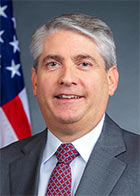Marking 60 Years of Technological Innovation and Expertise
It is often said that every good story has a beginning, a middle, and an end.
Well, the story of CACI is as good as they come, but ours has no end in sight. In fact, as we enter the 60th year into our journey, in many respects, our story continues to develop.
CACI has been at the cutting edge of innovation since Herb Karr and Harry Markowitz founded our company in the summer of 1962 to sell and teach the groundbreaking SIMSCRIPT. Creating disruptive technologies has long been our calling card and has defined and guided our company over the last six decades.
Our reputation of successful ingenuity is hard earned, built over the years by employees committed to delivering for our customers and fully invested in the success of CACI. Our commitments to character and integrity have never been sacrificed for the sake of success; in fact, we believe our growth and achievements in this ever-competitive landscape are directly tied to our unimpeachable ethics. The benefits we reap are owed as much to our solid character as our innovation.
For us, each success and milestone — and there have been too many to count over the years — is sweeter and more rewarding because we know that when we achieve, our government and military customers are stronger and our country safer.
Our story is detailed in the pages of this publication. As wonderful as our first 60 years have been, our story of success and growth are still a great work in progress with our employees writing new chapters every day.
With a legacy of excellence as our motivation, I believe our best days are still yet to come. Our story — like our growth, success, and our trailblazing — is to be continued.

President and Chief Executive Officer





